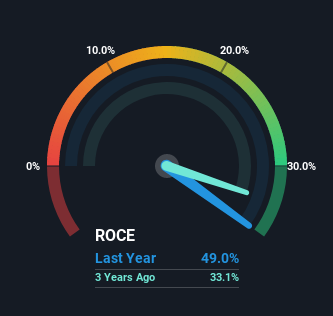
Finding a business that has the potential to grow substantially is not easy, but it is possible if we look at a few key financial metrics. In a perfect world, we'd like to see a company investing more capital into its business and ideally the returns earned from that capital are also increasing. If you see this, it typically means it's a company with a great business model and plenty of profitable reinvestment opportunities. With that in mind, the ROCE of AutoZone (NYSE:AZO) looks attractive right now, so lets see what the trend of returns can tell us.
Understanding Return On Capital Employed (ROCE)
For those that aren't sure what ROCE is, it measures the amount of pre-tax profits a company can generate from the capital employed in its business. To calculate this metric for AutoZone, this is the formula:
Return on Capital Employed = Earnings Before Interest and Tax (EBIT) ÷ (Total Assets - Current Liabilities)
0.49 = US$3.2b ÷ (US$15b - US$8.7b) (Based on the trailing twelve months to November 2022).
So, AutoZone has an ROCE of 49%. That's a fantastic return and not only that, it outpaces the average of 17% earned by companies in a similar industry.
Check out our latest analysis for AutoZone

In the above chart we have measured AutoZone's prior ROCE against its prior performance, but the future is arguably more important. If you're interested, you can view the analysts predictions in our free report on analyst forecasts for the company.
What The Trend Of ROCE Can Tell Us
In terms of AutoZone's history of ROCE, it's quite impressive. The company has consistently earned 49% for the last five years, and the capital employed within the business has risen 53% in that time. With returns that high, it's great that the business can continually reinvest its money at such appealing rates of return. You'll see this when looking at well operated businesses or favorable business models.
On a separate but related note, it's important to know that AutoZone has a current liabilities to total assets ratio of 57%, which we'd consider pretty high. This effectively means that suppliers (or short-term creditors) are funding a large portion of the business, so just be aware that this can introduce some elements of risk. While it's not necessarily a bad thing, it can be beneficial if this ratio is lower.
The Bottom Line On AutoZone's ROCE
AutoZone has demonstrated its proficiency by generating high returns on increasing amounts of capital employed, which we're thrilled about. And long term investors would be thrilled with the 220% return they've received over the last five years. So while the positive underlying trends may be accounted for by investors, we still think this stock is worth looking into further.
On a final note, we've found 3 warning signs for AutoZone that we think you should be aware of.
If you'd like to see other companies earning high returns, check out our free list of companies earning high returns with solid balance sheets here.
New: Manage All Your Stock Portfolios in One Place
We've created the ultimate portfolio companion for stock investors, and it's free.
• Connect an unlimited number of Portfolios and see your total in one currency
• Be alerted to new Warning Signs or Risks via email or mobile
• Track the Fair Value of your stocks
Have feedback on this article? Concerned about the content? Get in touch with us directly. Alternatively, email editorial-team (at) simplywallst.com.
This article by Simply Wall St is general in nature. We provide commentary based on historical data and analyst forecasts only using an unbiased methodology and our articles are not intended to be financial advice. It does not constitute a recommendation to buy or sell any stock, and does not take account of your objectives, or your financial situation. We aim to bring you long-term focused analysis driven by fundamental data. Note that our analysis may not factor in the latest price-sensitive company announcements or qualitative material. Simply Wall St has no position in any stocks mentioned.
About NYSE:AZO
AutoZone
AutoZone, Inc. retails and distributes automotive replacement parts and accessories in the United States, Mexico, and Brazil.
Limited growth with questionable track record.
Similar Companies
Market Insights
Community Narratives



